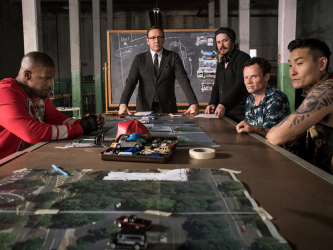One of the lines used in Edgar Wright’s new action/crime flick is lifted (credited) from Fight Club: “How’s that working out for you?” When TV’s Andy Levy reviewed the picture, he put the line in context:
Tyler Durden: Oh I get it, it’s very clever.
Narrator: Thank you.
Tyler Durden: How’s that working out for you?
Narrator: What?
Tyler Durden: Being clever.
Narrator: Great.
Tyler Durden: Keep it up then… Right up.
In Fight Club, it’s none-too-subtle dig at the Narrator’s use of “cute” and “snark” to avoid the implications of his own meaningless existence. Levy’s implication is not nearly so savage, I think. He’s pointing out that Wright is very clever and sometimes his movies can feel too clever.

Firing a gun inside a closed car? Ow.
Which is a mild criticism, and one I might agree with, at least to the extent of feeling it was a bit over-hyped by critics. It’s fun. The Flower, The Boy, His Girl and I all agreed it was “pretty good”, which is fainter praise than it deserves, really. But let’s start from the beginning
Ansel Elgort (The Fault In Our Stars) plays “Baby”, a young man who drives for “Doc” (Kevin Spacey) on the various heists that he plans. Baby’s back story is that he was in an accident as a child, that killed both his abusive father and singing mother, and left him with tinnitus, so he uses music to drown out the ringing. (This movie might actually be somewhat annoying at points if you actually have tinnitus.) This contrivance allows Wright to string together action pieces with the specific songs Baby listens to while fleeing from crime scenes.
This is actually very strong: Wright has a great visual feel and the opening parts of the movie are near “silent”, in the sense of having minimal dialogue, and very well choreographed. From the campy direction of “Spaced” and the Shaun of the Dead, Wright has forged a style that’s distinctive and broader in tone than seen in the Cornetto Trilogy (Shaun, Hot Fuzz and The World’s End).

Bad girl.
Anyway, Baby works for the bad guys because as a kid he stole Doc’s car, and doc has been making him “work it off” for the past several years. His step-father (C.J. Jones) doesn’t approve and, one imagines his potential girlfriend, the cute waitress at the local diner (Lily James, Cinderella), might not approve either. (Well, maybe a little.) Elgort and James are precious here, and one thing Wright does very well is handle their inherent cuteness with a level of finesse that keeps it from being cloying. I kept thinking I was going to end up disliking either or both but, nah.
Baby’s work means his colleague tend toward the psychotic, including Jamie Foxx, Jon Hamm, and Jon Bernthal (Me and Earl and the Dying Girl, Sicario), and sexy Mexican import Eiza González. The contrast between González and James is good: They’re both about the same age in real life (James is actually older) but Eiza’s dress and manner make her femme fatale material, whereas nearly 30 James looks like she’s fresh out of high school.

Good girl.
All these elements work toward a difficult (but relatively clear, morally speaking) set of choices for Baby, and the movie escalates the narrative in a “believable” fashion. I had a little trouble figuring out why Baby didn’t just bail in the middle of the third act—he’s given a lot of opportunities—but I think that he was afraid the rest of them would find him and kill him. I guess I needed a little more hand-holding there.
But as has been noted, especially by @JulesLaLaLand, Wright has a bit of an issue with his third acts. They tend to go a little nuts, and this one is no exception. It’s well done, but we all sort of thought the movie would have ended sooner (not that we objected to how it did end) and with the music and cars and the gunplay, etc., it almost feels like Wright lacks confidence in his own endings, so he amps the spectacle over the story.
I’m just guessing here. It’s a good movie, very good, and a lot of fun in a way movies are having trouble being these days. So big points for that.

Every meeting I’ve ever been in.
